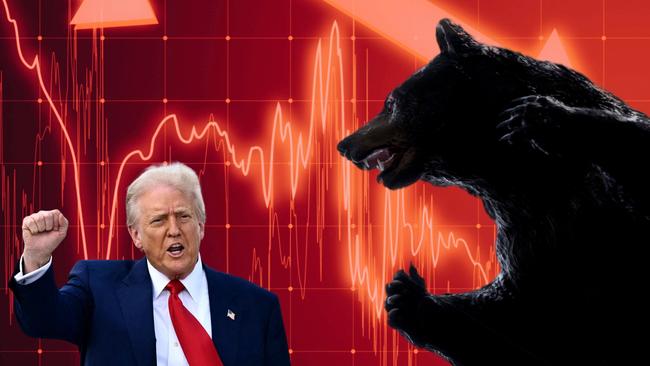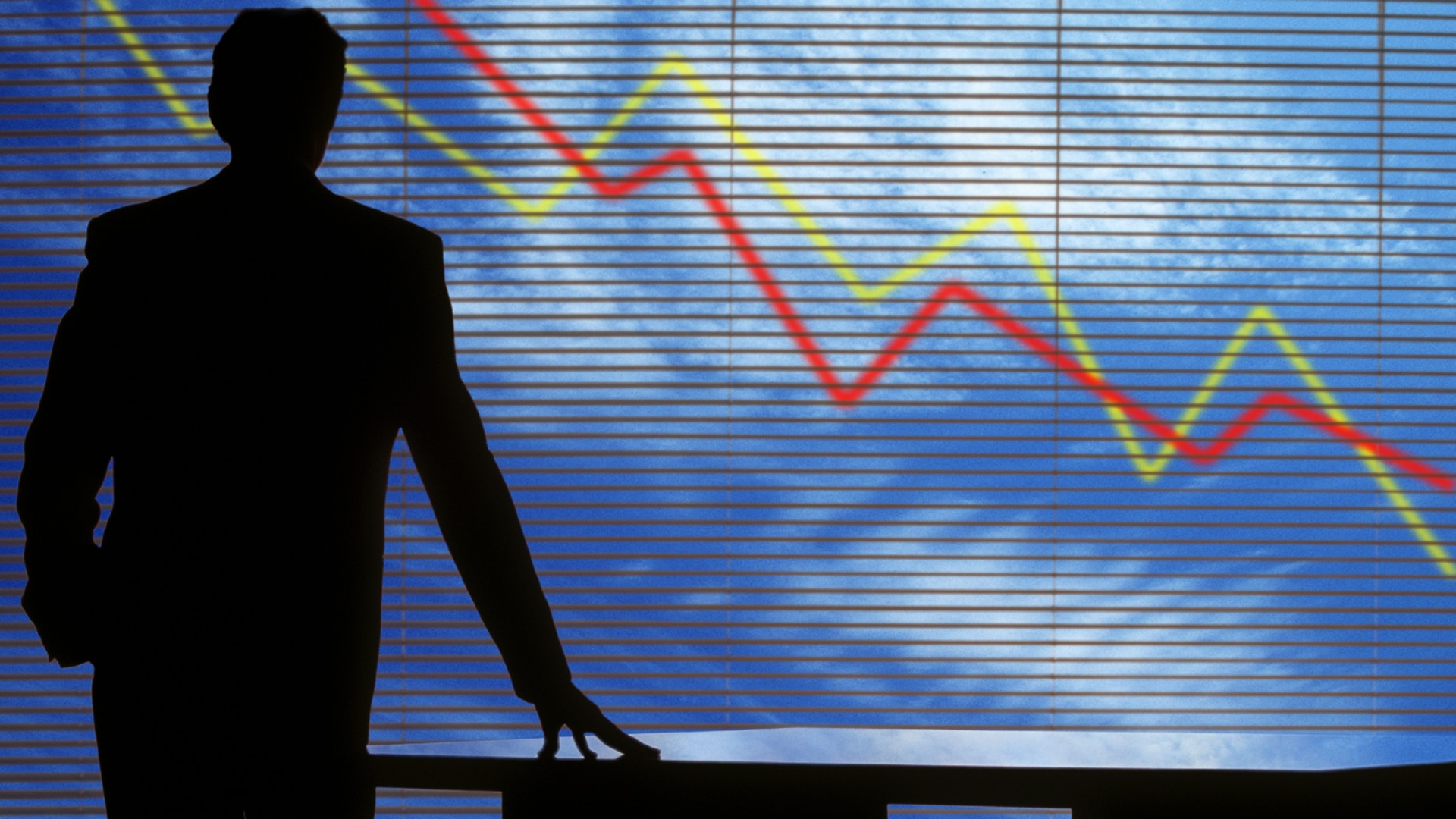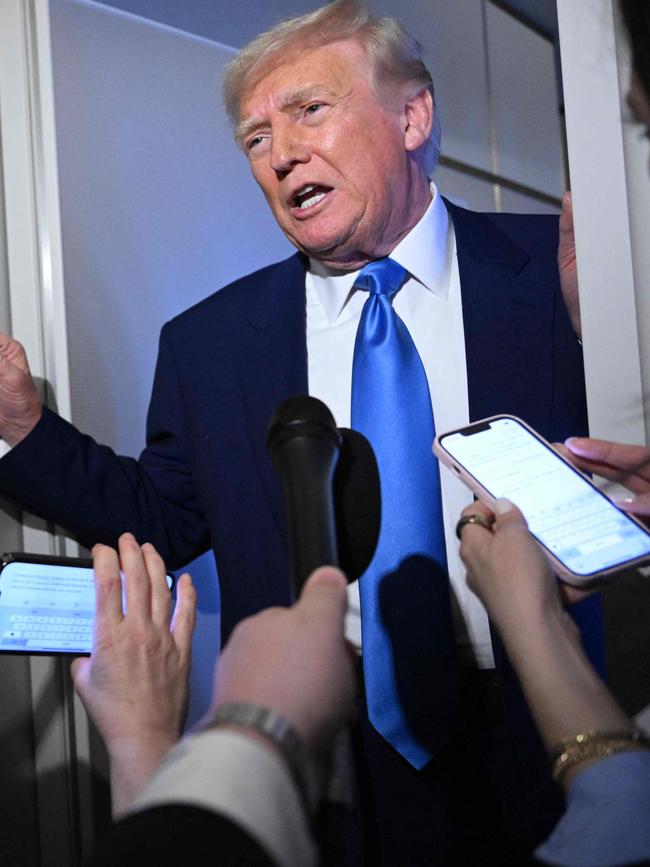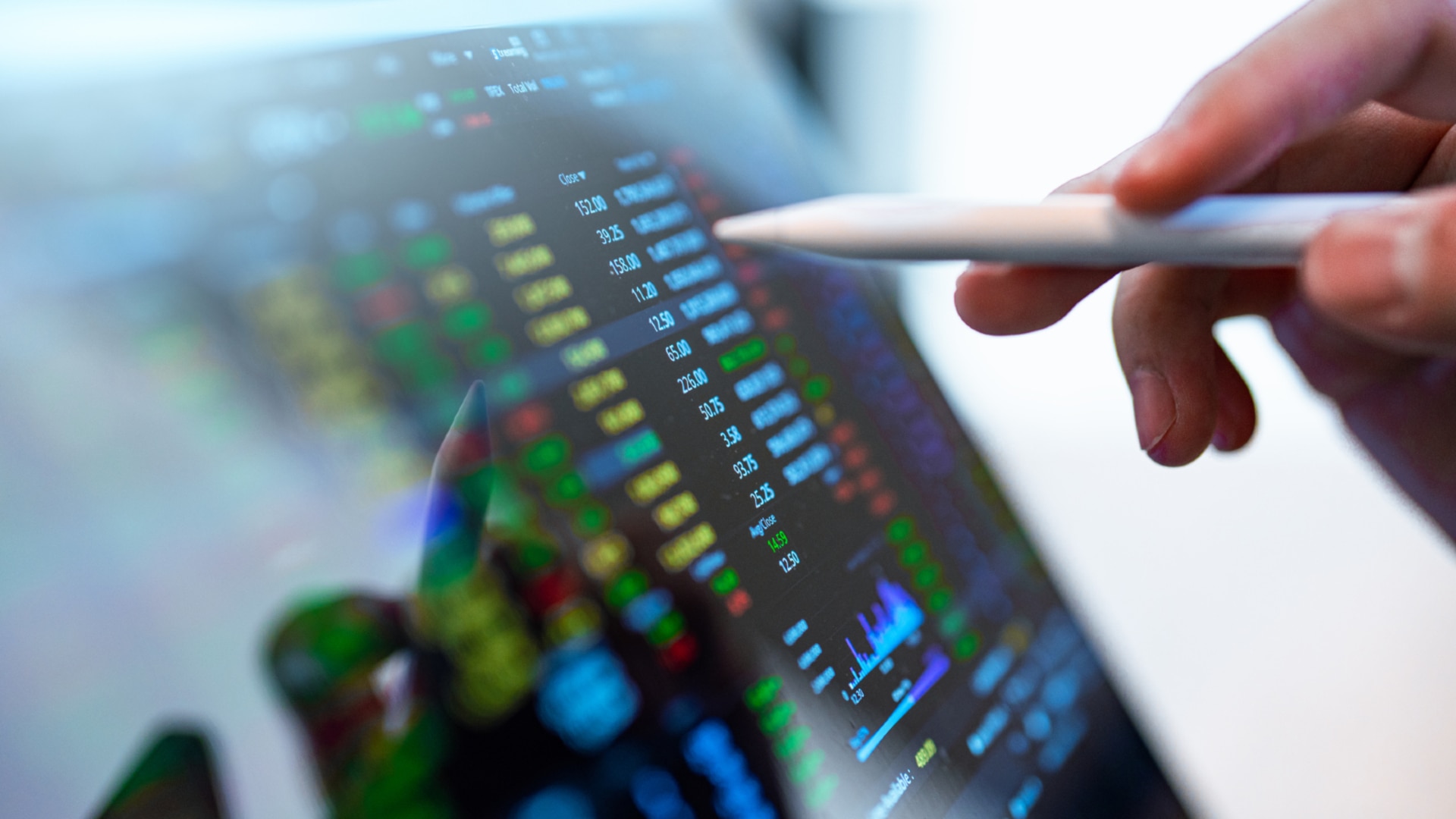Market carnage worsens as $112bn wiped off ASX amid global trade war
$112bn was wiped off the ASX on Monday with China retaliating against US tariffs and the Trump administration defiant while global markets crashed.

The prospect of a protracted world trade war with no catalyst in sight for arresting trillions of dollars of market losses consigned Australia’s sharemarket to its worst day in five years.
Around $112bn was wiped off the local bourse on Monday as global equities plunged for a third dramatic session and China’s sovereign wealth fund bought securities to shore up market stability.
The benchmark S&P/ASX 200 index closed down 324.5 points or 4.2 per cent to 7343.30 points after hitting a 16-month low of 7169.20.
That means the Australian market is 14.2 per cent below its record high close of 8555.8 points reached last month when investor euphoria around the prospect of a soft economic landing and the mega returns on offer from artificial intelligence stocks was at its peak.
Commonwealth Bank fell 6.2 per cent, BHP lost 6.1 per cent and Afterpay-parent Block fell 8.5 per cent. Chris Ellison’s lihtium and iron ore miner Mineral Resources fell 12 per cent.
“Many just can’t understand why Trump does not see the carnage he has created on Wall Street, and Main Street, if this continues,” said Bell Potter head of institutional sales and trading, Richard Coppleson. “This raises the serous chance of a US recession.”
“Many institutions and hedge funds have just walked away for any big bets in the market as they can’t invest in an environment that has no structure or certainty from the US President.”
In early trading the Australian dollar dived as much as 1.8 per cent to a five-year low of US59.33c and copper futures tumbled 8.1 per cent, although both recovered somewhat later in the session. It was the worst one-day drop since local shares fell 5.3 per cent on March 27, 2020 at the height of the Covid pandemic.

Brent crude oil futures fell as much as 3.9 per cent to $US63.01 per barrel as US investment banks including Morgan Stanley and Goldman Sachs slashed their price forecasts for the commodity on expectations global growth will dry up.
There were also big falls across the Asian region, with Japan’s Nikkei 225 down 7.8 per cent and South Korea’s KOSPI down 5.5 per cent. Trade resumed in China after a three-day long weekend with the Shanghai Composite down 8.5 per cent and the Hang Seng index diving 12 per cent.
S&P 500 futures fell as much as 5.3 per cent after the US benchmark dived 6 per cent on Friday when China announced an additional tariff of 34 per cent on US imports in retaliation for last week’s Liberation Day regime.
Risk aversion and safe haven demand increased as White House officials including US President Donald Trump expressed defiance and a lack of concern about the reaction to tariffs.
“I don’t want anything to go down, but sometimes you have to take medicine to fix something,” Trump told reporters on Air Force One as US futures signalled more pain for Wall Street.
“We have to solve our trade deficit with China,” Trump said.

“We have a trillion-dollar trade deficit with China, hundreds of billions of dollars a year we lose with China. And unless we solve that problem, I’m not going to make a deal.”
Any deal was contingent on China solving its surplus with the US, he added.
An arm of China’s sovereign wealth fund issued a statement on Monday saying it bought
exchange traded funds and pledged to keep buying, Bloomberg reported.
Treasury Secretary Scott Bessent saw “no reason that we have to price in a recession”.
“We’re going to have to see what the countries offer and if it’s believable,” he told NBC.
“I think we are going to have to see the path forward.”
Brokers such as JPMorgan now expect the US to slip into a recession this year.
JPMorgan head of global equity strategy, Mislav Matejka warned of “more to come” in the stocks rout after the S&P 500 fell almost 11 per cent in the past two days.
With the S&P 500 down 17 per cent from its February peak and the VIX volatility index spiking to 45, there had been a “a lot of repricing from the extremely complacent market setup” this year.
After such sharp VIX spikes in the past, stocks tended to rise 85 per cent of the time, but not if the US economy is entering a recession.
“Here, the last point is key, and we believe we will not be in the clear for a while yet,” Mr Matejka said.
He said the combination of trade and fiscal headwinds, together with the likely payback from the front-loading of orders ahead of tariffs, as well as the higher inflation expectations hurting real disposable incomes, will drive a sustained downturn in economic growth.
“Last week’s ‘Liberation day’ might mark the peak of trade uncertainty, but certainly not the end, especially with the likely retaliations coming up,” he added.
“In any case, in order for corporates to give in and to ultimately relocate production to the US, tariffs need to stay on the agenda. Even if some tariffs are walked back, the adverse impact on sentiment could be the end result.
“We believe that one should stay cautious on risk, as the above setup is likely to keep implying softer S&P 500, defensive equity internals, and lower bond yields, with further curve flattening.”

In order to be sustainably buying equities, beyond just technical bounces, “ultimately, we will transition to a more forceful Fed support, driving the re-steepening of the yield curve, and bullish equity market behaviour, but that is not likely before the second half of 2025,” he predicted.
Macquarie Equities Australian equity strategist Matthew Brooks warned of a looming bear market in Australian stocks, meaning a fall of 20 per cent, as the trade war worsens.
“With higher Trump tariffs, we think a bear market is even more likely,” he said.
Similarly, Macquarie Equities warned that growth headwinds will be amplified as the average US tariff is set to soar to 23 per cent after last week’s announcements take effect.
A leading US private sector survey was already showing a “drop” in US growth on pre-emptive activity before the latest tariffs, with a sharp fall in new orders relative to inventories, said Mr Brooks.
Meanwhile, US federal job cuts boosted March lay-offs to levels above the GFC and the Atlanta Fed’s GDPNow measure points to a stalling of US real consumer spending.
“A slowing consumer is still the most consistent indicator of bear markets, and we expect this to occur via a de-rating from still expensive levels,” he said.
While the “key upside risk” is a Trump pivot that rolls back tariffs and delivers tax cuts and deregulation, he thinks the Fed needs to pivot first, and is constrained by tariffs and inflation risks.
“If this view is right, the cycle needs to weaken more, driving equity volatility and a spike in credit spreads to force a Fed pivot,” he warned.







To join the conversation, please log in. Don't have an account? Register
Join the conversation, you are commenting as Logout